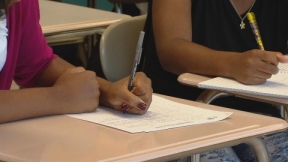
By: Ashmar Mandou
After a heated debate Wednesday afternoon, majority of the members of a Chicago Public Schools advisory committee for Latino students have resigned to protest school budget cuts that have affected primarily minority communities. “We see this not just as an assault on Latino students, neighborhoods and families, but we see this as a continuation of cuts in the African-American community and now cuts in the Latino community,” said Jose Rico, committee member. “We see this as one and the same,” added Rico after nearly all of the committee members had submitted their resignations. Earlier this month, CPS was faced with a $46 million “spending freeze” in an attempt to cover $215 million in state assistance that did not come through.

“We knew there would be consequences. It became very clear very quickly that some our schools, and frankly many of our Hispanic schools with large populations and poverty, were disproportionately impacted,” said school board President Frank Clark. The public outcry by education activists came as the Chicago Board of Education was scheduled to approve its latest budget for the year, a $5.4 billion spending plan that includes a series of cuts. “This is about time that the Latino community stands up on its own two feet and says, ‘Enough is enough, this has to end,” said Alderman George Cardenas. “We are going to demand changes in CPS leadership and leadership structure. This cannot continue.” Many schools have avoided the dismissal of teachers, instead schools have resorted to federal and state funds targeted for disadvantaged students to help stabilize their budgets.

Rauner’s administration issued a statement in regards to CPS. “The Rauner Administration strongly condemns cuts implemented by the Chicago Public School District, which were caused by decades of fiscal mismanagement, and disproportionately affected low-income students.” The Latino Advisory Committee was formed in 2014 under former CPS CEO Barbara Byrd-Bennett in an effort to bulk up the district’s outreach to a growing population within the school system. “We understand that these are tough decisions, and the role of the council has always been to be able to provide some input and to be able to deliberate on these decisions, and we were not used in that capacity,” said Rico.








